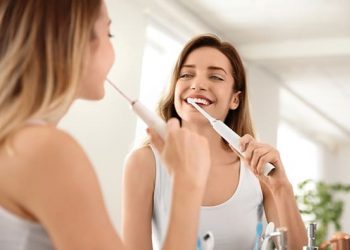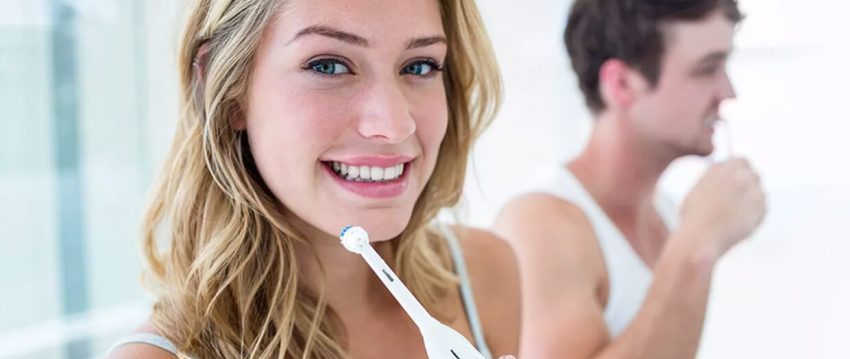Twice-daily brushing and flossing, coupled with regular visits to your dentist remain your best defenses against tooth decay and gum disease. Of course, you do need a sound brushing technique so we’re going to explain the proper way to brush teeth with electric toothbrush and manual toothbrush, to help you avoid plaque and tartar build up and preserve your dental health.
Why You Need A Good Brushing Technique?
Brushing and flossing twice a day is the only way to remove the plaque that develops on your teeth. If you don’t remove this plaque it hardens and turns into tartar or calculus build-up, a substance that contributes to tooth decay and gum disease, and which can only be removed by your dentist using special instruments.
Because it is possible for the acids contained in food to soften your dental enamel you should wait at least one hour after eating before you brush, to avoid doing damage to your teeth. In the mornings, you should brush your teeth before breakfast. In the evenings you should brush before bed, having left at least one hour since dinner.
Remember that plaque builds up quickly and easily at the back of your bottom front teeth, so be sure to give this area of your mouth adequate attention, and floss between your teeth to prevent tooth decay between your teeth..
While brushing cannot prevent plaque it does an effective job at managing it. Any plaque that you do not remove can be removed by your dentist, which is why you still need regular visits to your dentists, even if you do a good job at regular brushing.
What’s Better: A Manual Or Electric Toothbrush?
Research indicates that an electric toothbrush can be very beneficial if your brushing technique is inadequate at maintaining dental hygiene. This is especially true if you have problems with your hands, or for children who may not be as skilled.
Using an electric toothbrush offers a host of benefits to your dental hygiene including
- Timers so that you brush for the correct amount of time
- Following the correct motion which is the most effective way for plaque removal
- People who have problems that limit the dexterity of their hands such as arthritis or carpal tunnel syndrome
- Greater suitability for children who may still be getting used to the correct brushing technique.
So, What’s The Proper Way To Brush Teeth With Electric Toothbrush?
When you use an electric toothbrush the most important factors to remember are the angle at which you hold it to your gum, and the amount of pressure you apply when brushing. The toothbrush takes care of the correct action and technique but if you do not angle it correctly or you hold it in one spot for too long, you can cause some damage to your gums, which may result in receding gums.
 Brushing in a circular motion also protects your gums against recession, as brushing backwards and forwards to aggressively can damage them. remember : it’s the quality of your technique that makes the biggest difference.
Brushing in a circular motion also protects your gums against recession, as brushing backwards and forwards to aggressively can damage them. remember : it’s the quality of your technique that makes the biggest difference.
Whether you are brushing with a manual or electric toothbrush you only need to use a small, pea sized amount of toothpaste. The effectiveness of cleaning has more to do with your technique than with the quantity of toothpaste you use.
How To Brush Teeth Effectively With A Manual Toothbrush
How To Do It?
We always recommend a soft bristled brush if you opt for manual brushing over an electric toothbrush. You should hold your toothbrush at 45 degrees to your gum line and use circular movements across the surface of your teeth.
Choose a toothbrush with a small head and a flexible neck so that it can fit into small, hard-to-reach spaces.
It’s important that you are systematic and give each tooth and tooth surface enough cleaning so start at the back of your mouth and work your way forwards. If time is an issue, the suggestion has been to save two minutes of one of your favourite songs, so you get used to the passage of time.
How Long To Do It For?
It’s recommended that you brush your teeth for at least two minutes per session, taking care to clean the front and back of your teeth, as well as the flat biting side.
When Do You Need A New Toothbrush?
It’s recommended to replace your toothbrush or head if you have an electric toothbrush every three to four months, or if you notice the bristles are getting worn down. You should also change your toothbrush if you have been ill as it may harbour bacteria.
Toothbrushes that are wearing down before three months of use could be an indication that you are brushing too hard.
Cleaning Orthodontic Braces
If you wear braces it is recommended that you brush after every meal. You must take care to ensure that your braces are cleaned properly so that debris does not get trapped in them and cause dental decay. You will still hold your toothbrush at a 45 degree angle to your teeth but you must ensure that you clean the top and bottom of your braces as well.
Should You Use Mouthwash?
Mouthwash can help you in removing any debris that hasn’t been removed by brushing and flossing, but if your technique is correct it shouldn’t be necessary. Bear in mind that some mouthwashes contain alcohol and are thus not suitable for children. Alcohol may also cause dehydration in the mouth for adults, so you may want to seek out an alternative.
If you have questions about the proper way to brush teeth with an electric toothbrush it’s best to speak to a professional now, and avoid unnecessary tooth decay. Please contact us at (02) 8806 3799 for a convenient appointment.









